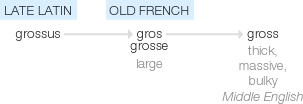Gross
Middle English (in the sense ‘thick, massive, bulky’): from Old French gros, grosse ‘large’, from late Latin grossus .
wiktionary
From Middle English gross(“whole, entire; flagrant, monstrous”), from Old French gros(“big, thick, large, stout”), from Late Latin grossus(“thick in diameter, coarse”), and Medieval Latin grossus(“great, big”), influenced by Old High German grōz(“big, thick, coarse”), from Proto-Germanic *grautaz(“large, great, thick, coarse grained, unrefined”), from Proto-Indo-European *gʰer-(“to rub, to stroke, to grind”). Cognate with French grossier(“gross”). See also French dialectal grôt, groût(“large”) (Berry) and grô(“large”) (Burgundy), Catalan gros(“big”), Dutch groot(“big, large”), German groß(“large”), English great. More at great.
etymonline
gross (adj.)
mid-14c., "large;" early 15c., "thick," also "coarse, plain, simple," from Old French gros "big, thick, fat; tall; strong, powerful; pregnant; coarse, rude, awkward; ominous, important; arrogant" (11c.), from Late Latin grossus "thick, coarse" (of food or mind), in Medieval Latin "great, big" (source also of Spanish grueso, Italian grosso), a word of obscure origin, not in classical Latin. Said to be unrelated to Latin crassus, which meant the same thing, or to German gross "large," but said by Klein to be cognate with Old Irish bres, Middle Irish bras "big."
Its meaning forked in English. Via the notion of "coarse in texture or quality" came the senses "not sensitive, dull stupid" (1520s), "vulgar, coarse in a moral sense" (1530s). Via notion of "general, not in detail" came the sense "entire, total, whole, without deductions" (early 15c.), as in gross national product (1947). Meaning "glaring, flagrant, monstrous" is from 1580s; modern meaning "disgusting" is first recorded 1958 in U.S. student slang, from earlier use as an intensifier of unpleasant things (gross stupidity, etc.).
gross (n.)
"a dozen dozen," early 15c., from Old French grosse douzaine "large dozen;" see gross (adj.). Earlier as the name of a measure of weight equal to one-eighth of a dram (early 15c.). Sense of "total profit" (opposed to net (adj.)) is from 1520s.
gross (v.)
"to earn a total of," 1884, from gross (adj.) in the "whole, total" sense. Slang meaning "make (someone) disgusted" (usually with out) is from 1971. Related: Grossed; grossing.
